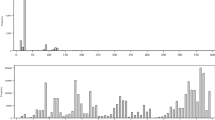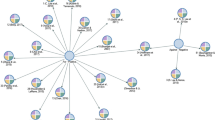Abstract
The median-voter hypothesis predicts convergence of party platforms across a one-dimensional political spectrum during majoritarian elections. Assuming that the convergence is reflected in legislative activity, we study the time evolution of political polarization in the National Assembly of the Republic of Korea for the past 70 years. By projecting the correlation of lawmakers onto the first principal axis, we observe a high degree of polarization from the early 1960s to the late 1980s before democratization. As predicted by the hypothesis, it showed a sharp decrease when party politics were revived in 1987. Since then, the political landscape has become more and more multi-dimensional under the action of party politics, which invalidates the assumption behind the hypothesis. For comparison, we also analyze co-sponsorship in the United States House of Representatives from 1979 to 2020, whose correlation matrix has been constantly high-dimensional throughout the observation period. Our analysis suggests a pattern of polarization evolving with democratic development, from which we can argue the power and the limitation of the median-voter hypothesis as an explanation of real politics.


Similar content being viewed by others
References
E.E. Schattschneider, The Semisovereign people: a realist’s view of democracy in America (Wadsworth Publishing Company, Boston, 1975)
D. Adamany, Am. Political Sci. Rev. 66, 1321 (1972)
G.C. Layman, T.M. Carsey, J.M. Horowitz, Annu. Rev. Polit. Sci. 9, 83 (2006)
J.E. Campbell, Polarized: Making Sense of a Divided America (Princeton University Press, Princeton, 2018)
A. Downs, An Economic Theory of Democracy (Harper & Row, New York, 1957)
R.G. Holcombe, Public Choice 61, 115 (1989)
J.L. Barr, O.A. Davis, South. Econ. J. 33, 149 (1966)
E.J. Mathis, C.E. Zech, Am. J. Econ. Sociol. 45, 403 (1986)
G.K. Turnbull, S.S. Djoundourian, Public Choice 81, 223 (1994)
B. Milanovic, Eur. J. Political Econ. 16, 367 (2000)
H. Kasper, Public Choice 10, 1 (1971)
W.A. McEachern, Natl. Tax J. 31, 129 (1978)
T. Romer, H. Rosenthal, J. Public Econ. 12, 143 (1979)
G.A. Boyne, Public Choice 53, 201 (1987)
D.C. Mueller, Public Choice III (Cambridge University Press, New York, 2003)
N. Canen, M.O. Jackson, F. Trebbi, Endogenous Networks and Legislative Activity (2021). https://doi.org/10.2139/ssrn.2823338
L. Harbridge, Is Bipartisanship Dead?: Policy Agreement and Agenda-Setting in the House of Representatives (Cambridge University Press, New York, 2015)
J.M. Curry, F.E. Lee, Perspect. Politics 17, 47 (2019)
C. Park, W. Jang, Korean J. Appl. Stat. 30, 403 (2017)
S.K. Baek, J. Kim, S.S. Lee, W.S. Jo, B.J. Kim, Physica A 560, 125178 (2020)
N. McCarty, Polarization: What Everyone Needs to Know® (Oxford University Press, New York, 2019)
J.B. Freeman, R. Dale, Behav. Res. Methods 45, 83 (2013)
R. Pfister, K.A. Schwarz, M. Janczyk, R. Dale, J. Freeman, Front. Psychol. 4, 700 (2013)
I.T. Jolliffe, Principal Component Analysis (Springer, 1986), pp. 93–94
M.E. Wall, L. Rocha, A. Rechtsteiner, Singular value decomposition and principal component analysis, in A Practical Approach to Microarray Data Analysis. ed. by D.P. Berrar, W. Dubitzky, M. Granzow (Springer, Cham, 2002), pp. 91–109
R.A. Serway, J.W. Jewett Jr., Physics for Scientists and Engineers with Modern Physics (Brooks/Cole, Boston, 2014), p. 10
J.H. Fowler, Polit. Anal. 14, 456 (2006)
M.A. Porter, P.J. Mucha, M.E. Newman, A.J. Friend, Physica A 386, 414 (2007)
Y. Zhang, A.J. Friend, A.L. Traud, M.A. Porter, J.H. Fowler, P.J. Mucha, Physica A 387, 1705 (2008)
B.M. Harward, K.W. Moffett, Legis. Stud. Q. 35, 117 (2010)
K.T. Macon, P.J. Mucha, M.A. Porter, Physica A 391, 343 (2012)
M.P. Rombach, M.A. Porter, J.H. Fowler, P.J. Mucha, SIAM J. Appl. Math. 74, 167 (2014)
C. Andris, D. Lee, M.J. Hamilton, M. Martino, C.E. Gunning, J.A. Selden, PLOS ONE 10, e0123507 (2015)
T. Colliri, L. Zhao, Sci. Rep. 9, 1 (2019)
Acknowledgements
This work was supported by a research grant of Pukyong National University (2020).
Author information
Authors and Affiliations
Corresponding author
Ethics declarations
Conflict of interest
Not applicable.
Additional information
Publisher's Note
Springer Nature remains neutral with regard to jurisdictional claims in published maps and institutional affiliations.
Rights and permissions
About this article
Cite this article
Kim, J., Baek, S.K. Democracy and polarization in the National Assembly of the Republic of Korea. J. Korean Phys. Soc. 80, 509–515 (2022). https://doi.org/10.1007/s40042-022-00400-6
Received:
Revised:
Accepted:
Published:
Issue Date:
DOI: https://doi.org/10.1007/s40042-022-00400-6




